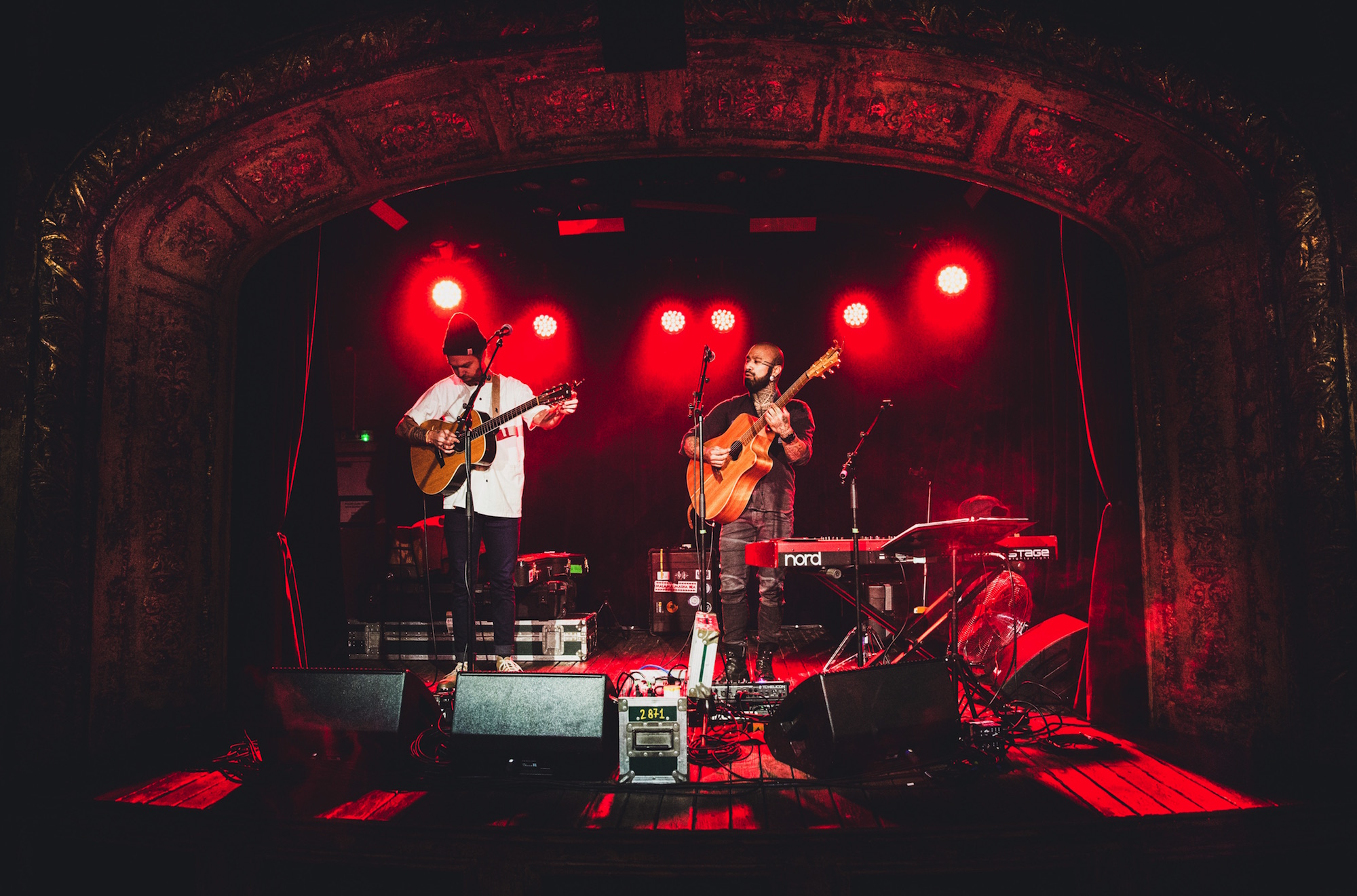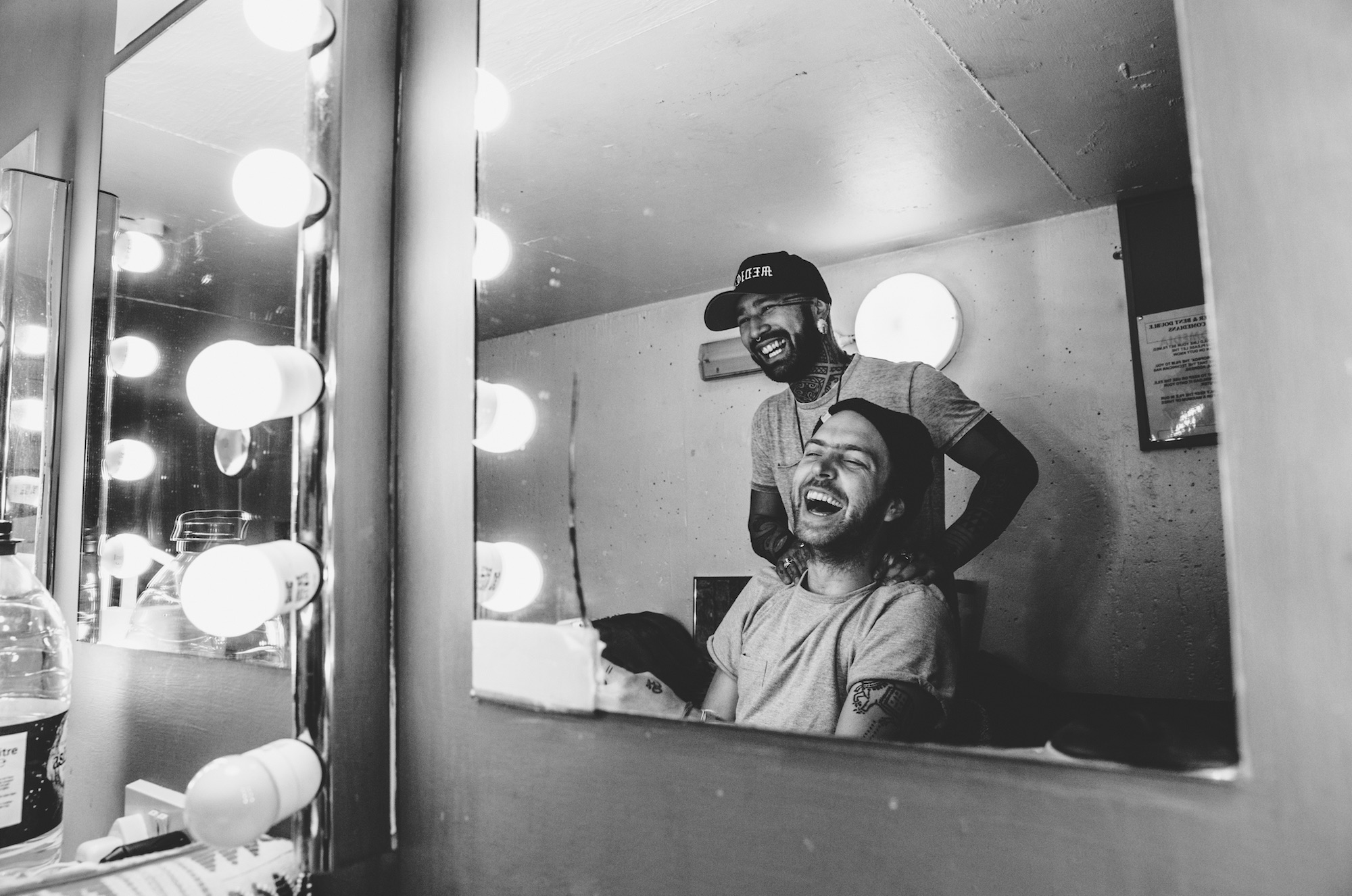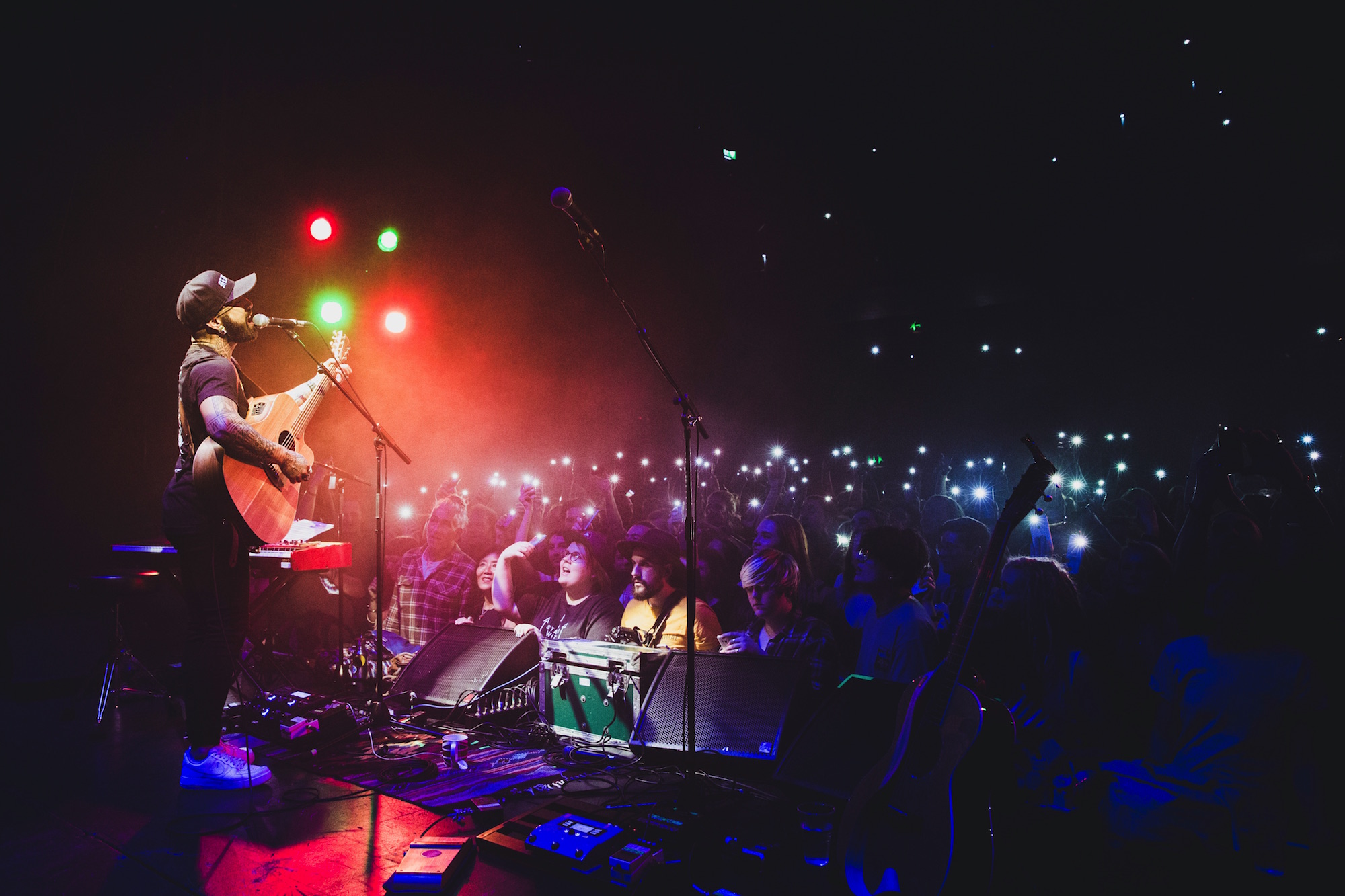They’re shamans of self-awareness; gurus of forgiveness; masters of mindful meditations – and fans are pilgrimaging across Europe for a glimpse of their rarely shared stage.
Over the past decade, indie-world musicians Nahko and Trevor Hall have independently conquered the American festival circuit, absorbing fans into their respective moveable feasts of spiritual transcendence along the way. Now, they’ve combined forces, like a conglomerate of consciousness spreading their message of personal freedom, social change, and boundless love to the people of Europe.
I caught up with Nahko at Whelan’s, Dublin – the pair’s jump-off point for the first leg of a nearly entirely sold-out European tour. Profound playfulness ensued.
Mike Finnegan: Welcome to Ireland, Nahko! You’re kicking off your European tour with Trevor Hall at a sold-out Whelan’s tonight. What have you two got in store for your fans here in Europe?
Nahko Bear: The frame of what we’re trying to do here together is a classic song-circle really. There’s no specific message really other than curating a show that has an Americana vibe to it.
For sure when I bring my band on different tours we’ll have a specific message and intention with them, whether it’s politics or any number of different topics. But with these shows, I’m not going to be playing a bunch of songs that are very political. More storytelling. It’s a really special, acoustic, intimate, storytelling, get-to-know-the-artist vibe.
MF: How did you and Trevor initially connect?
NB: We met at this festival in Minnesota… I’d already been listening to his music for a few years prior. I was a big fan of his, man. Then we met at this festival and the guy who put it on said, ‘You should meet Trevor – he’s a friend of mine.’
So we exchanged numbers, but he never called me.
Years later we played the same festival, connected again. And I was like, ‘Please man – text me!’ And I don’t think he did, again… [Laughing]. A few months later, though, I was playing a show in L.A. and Trevor came. That was the first time we really hung out. We didn’t even get to kick it that long. He left before the show was over, and later he texted me saying that he was super inspired, and he went and wrote this song “Obsidian” and he sent it to me.
When I listened to it I was freaking out just thinking, ‘Oh my god, this is so dope! Trevor Hall wrote a song about me…’ [Eccentric fanboy voice]
I didn’t respond to him for maybe four or five days because I was tripping on the song, and he, apparently, was super insecure and thought I didn’t like it! And I’m not even thinking about that, you know! I’m just fully tripping out on this song. But eventually we got in touch and, yeah… [Laughing] he never sent me another song like that again!

MF: Your latest album My Name is Bear is quite an inviting project, and a great insight into your early years as a traveling musician from 18-21 years of age. What compelled you to open up about these years in particular?
NB: A lot of those songs were sittin’ in my wallet. I didn’t do much to add to them, to be honest. I just kind of took the songs that were sitting there for a while – added some instruments, and some old recordings from like a RadioShack tape player I had.
I really cracked more open when I wrote the [accompanying] book of short stories, because it helped me remember what was going on at the time I was writing each song. It’s definitely a mad throwback, over ten years ago- just remembering what was going on then.
I’ve wanted to do this for years but never really had the time. Just had to carve the time out. It was a quick turnover. I only did it in twenty days.
MF: Twenty days.
NB: I’d have loved to have had more time, but that was all the time I really had!
MF: Can we expect to see Volume II – an exploration of your mid-twenties?
NB: Oh, definitely. I’ve got a whole ‘nother bunch of songs ready to go, but it’ll probably be in a couple years from now. I want to be able to give life to some of these older songs that have been sitting around.
MF: The story behind your song “San Quentin” is incredibly moving. You confronted and forgave the man who shot and killed your father, and helped him get released from San Quentin Prison. Have you had any contact with that man since?
NB: That would pertain a great follow-up, right? Yeah I plan to head out to the Philippines to try and find him. He got released and deported after I visited him. It’s a good story. It’s fucking crazy man. And it’s not the end. The whole story with that song – it’s not the end.
MF: How would you compare those nomadic years as a 20 year-old farming in Hawaii and Alaska, to your nomadic years on the road now as an established artist?
NB: Well, back then I was broke and now I make money traveling! The main difference is now people want to see me perform. Back then they were like, ‘Who the fuck are you?’ [Laughing]
But there’s still so much to learn…I think more recently I’ve been able to look at myself in a more objective way. What is it I do when I come to little towns? How do I create my show? What am I bringing from the place I pivot from at home, to people? It’s different every time.

MF: How was it working with Paris Jackson on your new music video for “Dragonfly”?
NB: It was awesome. She’s dope! She’s so authentically herself that it was just such a natural experience to work with her. We were friends already, but to work with somebody…you never know what’s gonna happen. But it was super easy. She was super playful.
MF: She’s a phenomenal dancer as well, eh?
NB: Yeah, she is!
MF: I wonder where she got her moves from…
NB: [Laughing] Probably her mom.
MF: You’ve built quite the following over the past few years, Nahko. How can people join your social revolution?
NB: Find modalities to deepen their connection with themselves. That’s really where it’s at. That’s what all of our greatest teachers have told us.
Everything you need, you have. And the reason it’s so difficult is because we’re so disconnected from ourselves. You know, fuck capitalism, you can let it just do whatever it wants… I mean obviously you want to change, and shift things, and how it’s all structured, but it’s really about you, and what you think you need.



